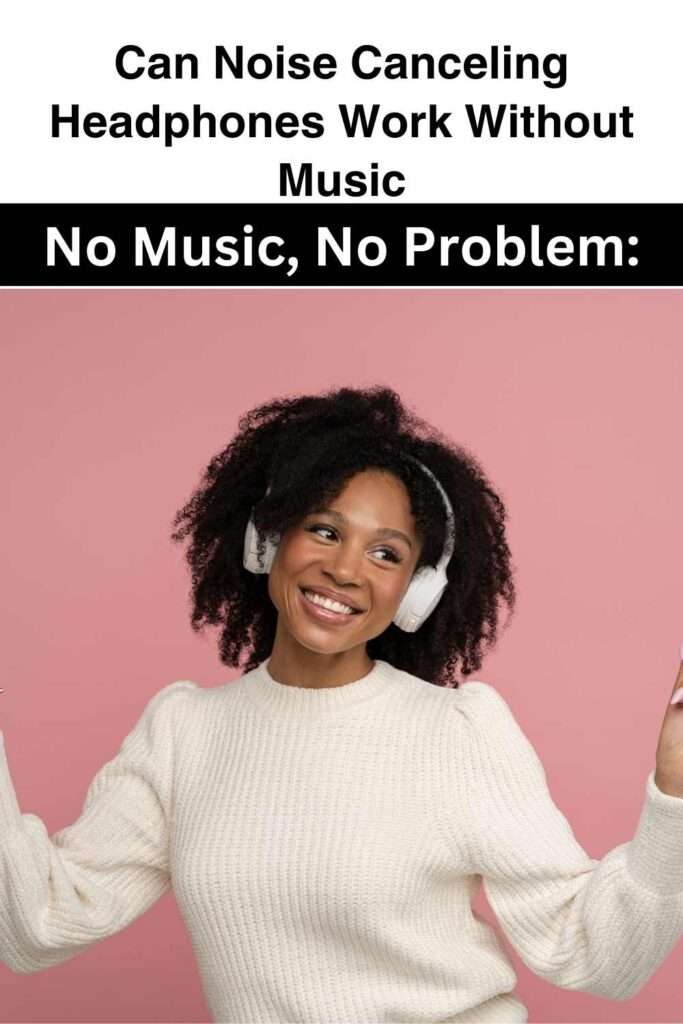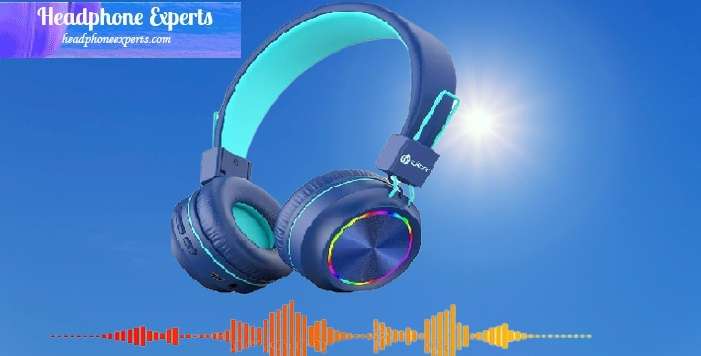When there is a lot of noise around you, do you find it difficult to concentrate or to find moments of peace and quiet? You are probably familiar with noise cancelling headphones, but have you ever considered whether or not they are effective even when there is no music playing in the background?
We will investigate the science behind noise-cancelling headphones in this article, as well as the unexpected advantages of using them even when there is no music playing.
In this topic we will cover:-
- How do noise cancelling headphones work?
- Can noise cancelling headphones work without music?
- Advantages of using noise cancelling headphones without music
- Disadvantages of using noise cancelling headphones without music
Can Noise Cancelling Headphones Work in the Absence of Music?
1. How do Noise Cancelling Headphones Work?

The technology that is used in noise-canceling headphones is known as Active Noise Cancellation (ANC) (short for Active Noise Cancellation).
The active noise cancellation (ANC) system works by first recording ambient noise with microphones and then producing sound waves that are the polar opposite, also known as “the opposite,” of the ambient noise.
These negative sound waves are able to effectively cancel out the noise that is coming from the outside, which results in the listener being in a quiet environment.
The headphones come equipped with circuitry that automatically and perpetually adjusts the amount of negative sounds, thus blocking out any outside noise.
This significantly lessens the amount of background noise, enabling the user to concentrate more easily or listen to music without being disrupted by sounds from the outside world.
2. Can noise cancelling headphones work without music?

Yes, noise-cancelling headphones still work even when there is no music playing. In point of fact, some users prefer to use noise cancelling headphones without music. This is in order to improve their ability to concentrate, relieve stress, or get a better night’s sleep.
Even when there isn’t any music playing, the active noise cancellation (ANC) technology in noise-cancelling headphones continues to do its job and block out ambient noise.
The microphones in the headphones pick up sounds from the surrounding environment, and the built-in circuitry generates negative sound waves to cancel out the noise, thereby providing the user with a peaceful environment in which to listen to their music.
It is critical to keep in mind that prolonged use of any headphones, including noise-cancelling headphones, has the potential to have an impact on one’s hearing, and that wearing headphones for an extended period of time may cause discomfort for some users.
When used in moderation, noise-cancelling headphones that do not play music can, on the other hand, provide significant benefits for users who are looking to improve their ability to concentrate, lower their levels of stress, or improve the quality of their sleep.
3. Advantages of using noise cancelling headphones without music

There are several advantages of using noise cancelling headphones without music, including:
Improved sleep quality:
People who have trouble sleeping as a result of noise in their environment may find that wearing noise-cancelling headphones during sleep without listening to music helps them block out distractions and facilitates better sleep.
Enhanced concentration and focus:
Noise cancelling headphones are an effective tool for blocking out ambient noise and improving concentration, and they are a great option for people who have to work in a distracting environment or study in a public setting.
Reduced stress and anxiety:
Users of noise cancelling headphones may experience less stress and anxiety as a result of the headphones’ ability to block out ambient noise.
Versatility:
Even if you’re not listening to music, you can enjoy a variety of activities—including traveling, working, and relaxing—while wearing noise-cancelling headphones.
Quiet environment:
Users are able to continue to enjoy a quiet environment even when they are not listening to music because the noise cancelling technology works even when there is no music playing.
4. Disadvantages of using noise cancelling headphones without music

While there are several advantages to using noise cancelling headphones without music, there are also a few potential disadvantages to consider, including:
Possible discomfort from prolonged use:
When worn for an extended period of time, headphones can cause discomfort and even pain, particularly for people who have ears that are sensitive to sound.
Possible effect on hearing:
When used for an extended period of time at loud volumes, headphones of any kind, including those that cancel out ambient noise, have the potential to have a negative impact on one’s hearing.
Cost:
When compared to standard headphones, the cost of high-quality noise-cancelling headphones can be significantly higher.
Dependence on battery:
Because the functionality of certain noise-cancelling headphones is dependent on batteries, users may be required to ensure that their headphones are always charged or to carry a spare battery.
Possible interference with other devices:
There is a possibility that noise-cancelling headphones could cause functionality issues with other wireless electronic devices, such as cell phones or laptops, in certain circumstances.
Even though the drawbacks of using noise-cancelling headphones when there is no music playing aren’t that big of a deal, it’s still important to give them some thought before making a purchase or putting the headphones through their paces for an extended period of time.
Conclusion
In a nutshell, noise-cancelling headphones are an adaptable tool that can provide significant benefits to individuals who are looking to improve their quality of sleep, concentration, and level of stress.
Active noise cancellation technology is effective at blocking out external noise, providing the user with an environment that is quiet regardless of whether or not music is playing in the background.
However, before using the headphones for extended periods of time, it is important to think about the potential drawbacks, such as discomfort caused by prolonged use and the possibility of hearing damage.
In conclusion, listening to music while wearing noise-canceling headphones is a matter of individual preference and the requirements of the situation.
Frequently asked questions
Can noise cancelling headphones work without music?
Yes, noise-canceling headphones can function even when there is no music playing. Even when the headphones are not being used to listen to music, the active noise cancellation (ANC) technology continues to function to block out ambient noise in the environment.
What are the benefits of using noise cancelling headphones without music?
The use of noise-cancelling headphones in the absence of music has been shown to improve the quality of sleep, enhance concentration and focus, reduce stress and anxiety, and provide an environment that is quiet.
Do noise cancelling headphones block out all noise?
Although noise canceling headphones are designed to effectively reduce the amount of noise coming from the outside world, it is possible that they will not block out all sounds. The noise cancellation technology’s efficiency will vary, depending not only on the headphones used but also on the amount of ambient noise in the surrounding area.
Can noise cancelling headphones damage your hearing?
It is possible that using headphones of any kind, including noise-cancelling ones, for an extended period of time at loud volumes could have a negative impact on one’s hearing. For the sake of your hearing, you should limit the amount of time you spend listening to music with headphones and keep the volume at an appropriate level..
Are noise cancelling headphones comfortable to wear for long periods of time?
The level of comfort offered by noise-cancelling headphones will vary depending on the type of headphones used and the individual preferences of the person wearing the headphones. It’s possible that using headphones for an extended period of time could cause discomfort or even pain for some users, particularly those with ears that are particularly sensitive.

